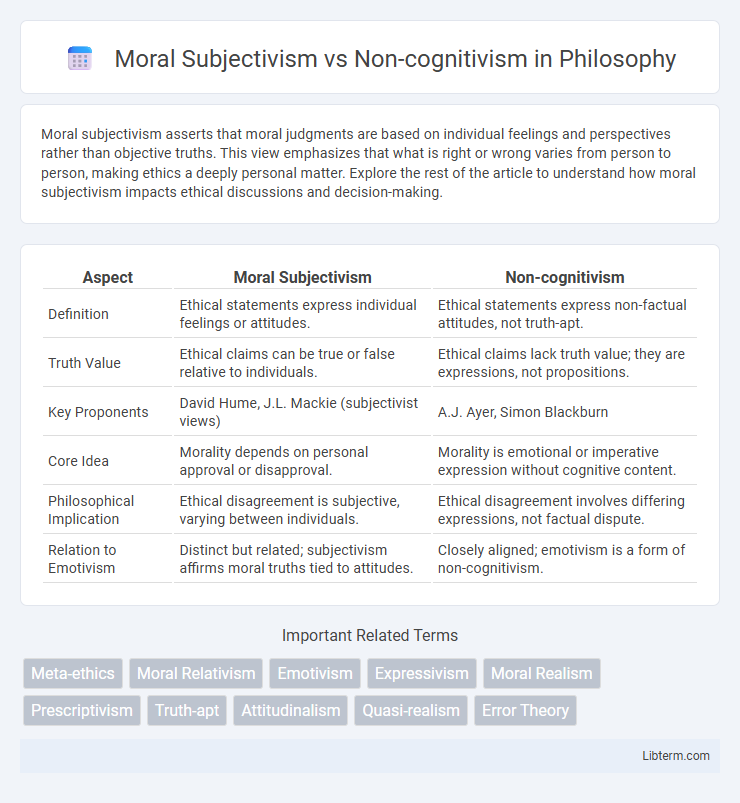Moral subjectivism asserts that moral judgments are based on individual feelings and perspectives rather than objective truths. This view emphasizes that what is right or wrong varies from person to person, making ethics a deeply personal matter. Explore the rest of the article to understand how moral subjectivism impacts ethical discussions and decision-making.
Table of Comparison
| Aspect | Moral Subjectivism | Non-cognitivism |
|---|---|---|
| Definition | Ethical statements express individual feelings or attitudes. | Ethical statements express non-factual attitudes, not truth-apt. |
| Truth Value | Ethical claims can be true or false relative to individuals. | Ethical claims lack truth value; they are expressions, not propositions. |
| Key Proponents | David Hume, J.L. Mackie (subjectivist views) | A.J. Ayer, Simon Blackburn |
| Core Idea | Morality depends on personal approval or disapproval. | Morality is emotional or imperative expression without cognitive content. |
| Philosophical Implication | Ethical disagreement is subjective, varying between individuals. | Ethical disagreement involves differing expressions, not factual dispute. |
| Relation to Emotivism | Distinct but related; subjectivism affirms moral truths tied to attitudes. | Closely aligned; emotivism is a form of non-cognitivism. |
Defining Moral Subjectivism
Moral Subjectivism asserts that moral judgments are expressions of individual preferences, emotions, or attitudes rather than objective truths. It holds that statements like "X is wrong" reflect personal or cultural beliefs, making morality inherently subjective and variable. This contrasts with Non-cognitivism, which interprets moral language as non-factual expressions, such as commands or emotions, denying that moral claims possess truth values.
Understanding Non-cognitivism
Non-cognitivism posits that moral statements do not express propositions or facts but rather emotional attitudes or prescriptions, thereby rejecting truth-apt conditions typical of moral realism. This theory emphasizes that ethical language functions primarily to influence behavior or express approval and disapproval, rather than to describe moral realities. Central frameworks within non-cognitivism include emotivism and prescriptivism, both highlighting the non-factual, expressive nature of moral discourse.
Key Differences Between the Theories
Moral subjectivism asserts that moral judgments express individual attitudes or feelings and are truth-apt, meaning they can be true or false depending on the individual's perspective. Non-cognitivism, however, claims that moral statements do not express propositions and lack truth values, functioning instead as expressions of emotions or commands. This fundamental difference centers on moral subjectivism treating moral claims as cognitively meaningful, while non-cognitivism views them as non-cognitive expressions.
Historical Origins and Influential Thinkers
Moral Subjectivism traces back to ancient Greek sophists like Protagoras, who asserted that moral judgments are based on individual perceptions, emphasizing relativism in ethics. Non-cognitivism emerged in the 20th century through logical positivists such as A.J. Ayer and Charles Stevenson, who argued that moral statements express emotions or prescriptions rather than factual claims. These foundational perspectives shaped contemporary meta-ethical debates by challenging the objectivity and truth-apt status of moral language.
Core Arguments for Moral Subjectivism
Moral subjectivism asserts that moral judgments are expressions of individual attitudes or preferences, emphasizing personal experience as the basis for ethical truth. It argues that moral statements are neither objectively true nor false but reflect the speaker's internal perspective, allowing for cultural and personal variability. This view contrasts with non-cognitivism, which holds that moral language functions primarily to express emotions or prescriptions rather than to state facts.
Core Arguments for Non-cognitivism
Non-cognitivism argues that moral statements do not express propositions or truths but rather emotional attitudes or prescriptions, making them neither true nor false. Key arguments include the Frege-Geach problem, which challenges the consistency of non-cognitivist interpretations in complex moral reasoning, and the argument from moral disagreement, which suggests that deep, irresolvable conflicts indicate subjective attitudes rather than objective facts. Furthermore, non-cognitivists highlight the motivational component of morality, emphasizing that moral language functions to influence behavior rather than to describe states of the world.
Meta-Ethical Implications
Moral subjectivism asserts that ethical statements express individual attitudes or preferences, leading to the meta-ethical implication that moral truths are inherently relative and lack objective validity. Non-cognitivism posits that moral language merely conveys emotions or prescriptions rather than factual claims, challenging the notion of moral knowledge or truth. Both perspectives undermine traditional realist views by rejecting the existence of universal moral facts, influencing debates on moral disagreement and the nature of moral reasoning.
Common Criticisms and Challenges
Moral subjectivism faces criticism for its inability to account for moral disagreement, as it reduces moral statements to individual preferences, making all opinions equally valid and undermining objective moral debate. Non-cognitivism struggles with the Frege-Geach problem, which questions how moral statements can retain meaning in logical arguments without truth values, challenging its claim that moral utterances express emotions or prescriptions rather than beliefs. Both theories grapple with explaining moral motivation and normative force consistently, resulting in debates about their adequacy in capturing the complexity of ethical language and practice.
Real-World Applications and Examples
Moral subjectivism influences legal systems by emphasizing individual intention and personal belief in ethical decision-making, often affecting jury deliberations and sentencing. Non-cognitivism appears in advertising and political rhetoric, where moral language functions to persuade and influence rather than state objective truths. Both theories shape social dynamics by guiding how people interpret and respond to moral statements in everyday interactions.
Conclusion: Evaluating the Debate
Moral subjectivism asserts that moral judgments reflect individual attitudes, making ethical statements expression of personal preference rather than objective facts. Non-cognitivism extends this by claiming moral language functions primarily to express emotions or prescriptions, lacking truth-apt qualities. Evaluating these positions reveals challenges in grounding universal moral norms, highlighting the tension between descriptive subjectivity and the prescriptive nature of ethics.
Moral Subjectivism Infographic

 libterm.com
libterm.com